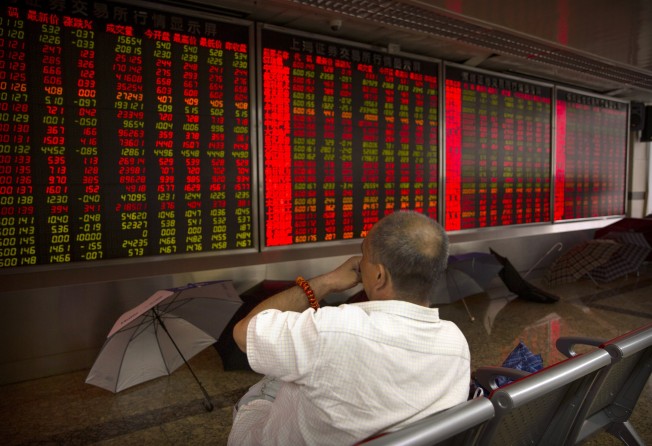Weak earnings led by Xiaomi keep gains in check in Hong Kong as investors await trade war developments
- Xiaomi, Hong Kong and China Gas, Geely and Bank of Asia disappoint investors with earnings reports
- Kweichow Moutai racks up eighth consecutive trading day above 1,000 yuan

Weak earnings by Chinese smartphone giant Xiaomi as well as Hong Kong and China Gas weighed on the Hang Seng Index, with the ongoing US-China trade war being blamed for at least part of their difficulties.
Even so, the Hang Seng Index managed to eke out a small gain on Wednesday, closing ahead 0.15 per cent, at 26,270.04.
The Shanghai Composite also held on to a teensy gain – a mere 0.01 per cent, which left it at 2,880.33. The Shenzhen Composite Index ended down a bit, by 0.09 per cent, at 1,572.62.
“The [Hong Kong] market has no clear direction after a significant rebound on Monday, and decreasing turnover affirms that,” said Alan Li of Atta Capital. “The Hang Seng is likely back to go back to a boring status until some progress is seen in the trade war negotiation or there is a further rate cut by (the US Federal Reserve).”
Hong Kong and China Gas, the city’s dominant piped-gas provider, closed down 5.3 per cent, at HK$16.20, making it the top loser on the benchmark. It posted an 18.8 per cent fall in net profit year on year to HK$3.89 billion for the year’s first half.
It got other bad news: Daiwa cut it to hold from outperform, and lowered its target price to HK$17.90 from HK$18.50. Goldman Sachs reiterated its neutral rating on the stock, but lowered its target price to HK$15.95 from HK$17.12.
Its profit growth may slow in the second half of the year as US-China trade tensions hurt industrial demand, according to a new note from Bloomberg Intelligence analysts.
Xiaomi closed down about 5 per cent at HK$8.96, after reporting its second-quarter profits were plunged 87 per cent amid the global smartphone market slowdown.
Bank of East Asia fell 1.7 per cent to HK$20.85, after it said its first-half profit fell by nearly 75 per cent.
And Geely Auto fell 0.5 per cent to HK$11.04, after reporting its profit fell 40 per cent to 4 billion yuan in the first half, while revenue was down 11 per cent to 47.55 billion yuan in the same period.
Geely, describing its performance as “below management’s expectations”, blamed weak demand and fierce competition, as well as the US-China trade war and the rush by local governments to implement new emissions standards in major cities.
In a stock filing, the Chinese carmaker said its total sales in the first six months of the year in China fell 19 per cent year on year to 613,061 units. That is at a time when overall passenger vehicle sales in China fell 21.7 per cent, according to the China Association of Automobile Manufacturers.
Meanwhile, Cathay Pacific Airways, which last week found itself sucked up into fallout from the protests that have rocked Hong Kong, closed down 2.25 per cent at HK$10.42. The city’s flagship carrier is trying to get beyond controversy that damaged its brand with all-important Chinese travellers and led to the ouster of its CEO, Rupert Hogg.
Rising stocks included China Resources Beer Holdings, which jumped 3.1 per cent to HK$43.20, and Sino Biopharmaceutical, which gained 3.6 per cent to HK$10.46.
And AAG Energy, mainland China’s largest non-state controlled producer of natural gas, surged, closing up 7.9 per cent at HK$1.37, after it posted a 64.6 per cent year on year jump in net profit to 338.6 million yuan for the year’s first half.
Hotpot chain Haidilao International Holding’s shares shot up 7.7 per cent to HK34.30. At one point it was at an all-time intraday high of HK$35.3. Haidilao reported on Tuesday that its net profit surged by 41 per cent in the first half from the same period last year.
Yihai International Holding, which supplies condiments to Haidilao, climbed 2 per cent to HK$47.25.
On the mainland, information technology and real estate stocks helped the Shanghai Composite Index limp across the day’s finish line with a claim to gains.
Eleven stocks, representing a range of sectors, ended the day at or near the upside 10 per cent limit. They included Shanghai Shibei Hi-Tech, a real estate business operator based in Shanghai, Shanghai Shenda, a textile importer and exporter, and Dynagreen Environmental Protection Group, which is based in Shenzhen and collects and incinerates garbage.
Meanwhile, Kweichow Moutai slipped 0.37 per cent to 1,066 yuan. That was the eighth consecutive trading day that the world’s largest liquor maker has closed above 1,000 yuan.
It became the first Chinese company to sail across that threshold on July 1, and it stayed there the following day. But then it had a streak where it could not get back to that level.